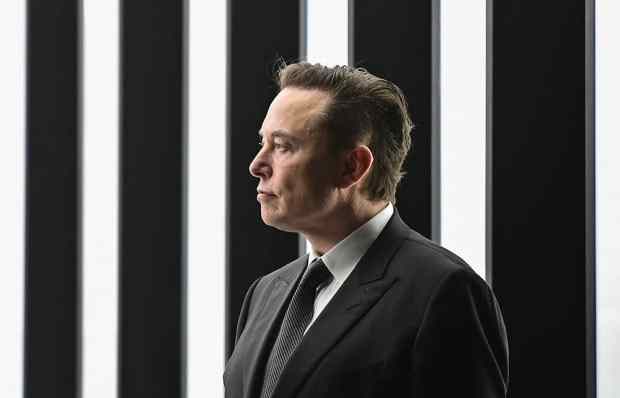This column has long been a sucker for a grand projet. ‘Time for a trip to Boris Island,’ I gushed in 2010 when London’s then mayor came up with his much-mocked (though in engineering terms not unfeasible) wheeze to shift Heathrow to a giant man-made landing strip in the Thames estuary. But even I could see no merit in the Foreign Secretary’s equally unscripted suggestion, during the recent Sandhurst summit with President Macron, of a bridge across the Channel — which would play havoc with vital shipping lanes and cost upwards of £120 billion. If the objective is to facilitate continuing trade with Macron’s compatriots after we leave the EU, as one expert observed: ‘It would really be cheaper to move France closer.’
So let us leave that one as a blot on Boris’s jottings pad. Instead let us cleave to the idea that multi-billion infrastructure schemes are not always about political grandstanding. They can be transformative for commuters and commerce, and provide Keynesian stimulus when economies are depressed. Though they are best built with as much private-sector risk capital as it’s possible to mobilise, they are not automatically — as ardent free-marketeers claim — ‘a waste of taxpayers’ money’. Governments have a duty both to renew existing infrastructure as it deteriorates and to plan new works beyond the scope of private investors that will benefit future generations of citizens.
I’ll admit this line of argument has become a little harder to sustain since the demise of Carillion, followed by Transport Secretary Chris Grayling’s glib reassurance that it will not delay the ill-starred HS2 project, on which the debt-laden engineering contractor was awarded a major piece of work last year, even though clearly already under severe financial strain. In search of the positive, I prefer to focus on Crossrail, the great feat of tunnelling beneath London that is scheduled to open its first section on time in December.
It is also still expected to be completed within its ‘£14.8 billion funding envelope’, having used contingency reserves to cover cost overruns on elements such as station works at Bond Street, Paddington and Liver-pool Street, where contracts priced at £83 million actually came in at £246 million. While the purple roundels of the Elizabeth Line, as we must learn to call it, are already being fitted at central stops on the 73-mile route, the Unite union is doing its best to hold up the finishing touches by calling on electricians to strike for extra ‘completion payments’. But having followed this project closely over the years, I’m confident it will be a cause for Londoners to celebrate — and will demonstrate the case, more coherently than Boris Johnson has ever done, for continuing to think big and bold on infrastructure investment.
Dyson’s EU dosh
I have no beef with Sir James Dyson, even though I had to consign two of his colourful space-age vacuum cleaners to the recycling dump because they repeatedly broke down (I ended up buying a much plainer, more reliable one made by Sebo of Germany). But he seems to be cross with me (Letters, 20 January) for writing that the current EU system of paying farm subsidies in proportion to size ‘absurdly favours wealthy landowners’ such as himself.
I’m happy to acknowledge that, unlike some other big recipients of Brussels largesse, Dyson has invested millions of his own alongside 2016’s £1.6 million ‘basic payment’ subsidy cheque (up from £1.4 million in 2015) to improve the vast acreage of his Beeswax farming enterprise. I merely pointed out that the mass of smaller British farmers were glad to hear Michael Gove say the existing system ‘is unjust, inefficient and drives perverse outcomes… It gives the most from the public purse to those who have the most private wealth. It bids up the price of land, distorting the market, creating a barrier to entry for innovative new farmers and entrenching lower productivity.’
And I might add that even the National Trust, reportedly the only landowner to receive even more EU dosh than Dyson, has said: ‘Rather than being paid for how much land you happen to farm, a new model which delivers clear public benefit from the money being spent is within reach after Brexit.’
Sir James argues for ‘encouraging’ rich and poor farmers alike, so long as they are doing the right things. But he needs to persuade his fellow farmers and the Secretary of State, not me.
The blockchain effect
In a week that felt rather starved of exciting business stories — the fat cats were evidently too busy packing for Davos — an unknown called Stapleton Capital, previously described as a telecoms investor, notched up a brief 130 per cent spike in its share price by changing its name to ‘Blockchain Worldwide’ and announcing that it has ‘seen a number of very exciting blockchain opportunities in recent months’ even if it has yet to buy into any of them. This brilliantly simple device — the cunning name change, not the cryptocurrency payment system — was road-tested last month by New York-based Long Island Iced Tea Corp, which more than tripled its share price after regenerating as ‘Long Blockchain Corp’ and announcing an instant change of focus from cold beverages to hot crypto-fintech.
Meanwhile, there’s Coinsilium, first mentioned here two years ago, whose shares (listed on the Nex exchange) have advanced from 3p last October to 16p this week. Coinsilium is an ‘accelerator’ of early-stage blockchain ventures that has succeeded in building a portfolio of actual investments and has even sold one of them, SatoshiPay, at a 363 per cent profit. So there’s real business going on in the sector as well as tomfoolery reminiscent of the worst of the 1990s dotcom boom; and there’s real potential in blockchain technology, distinct from the crazy world of Bitcoin. It’s all highly speculative territory, but at least it offers moments of brightness for a dull January.
Got something to add? Join the discussion and comment below.
Get 10 issues for just $10
Subscribe to The Spectator Australia today for the next 10 magazine issues, plus full online access, for just $10.
You might disagree with half of it, but you’ll enjoy reading all of it. Try your first month for free, then just $2 a week for the remainder of your first year.















Comments
Don't miss out
Join the conversation with other Spectator Australia readers. Subscribe to leave a comment.
SUBSCRIBEAlready a subscriber? Log in